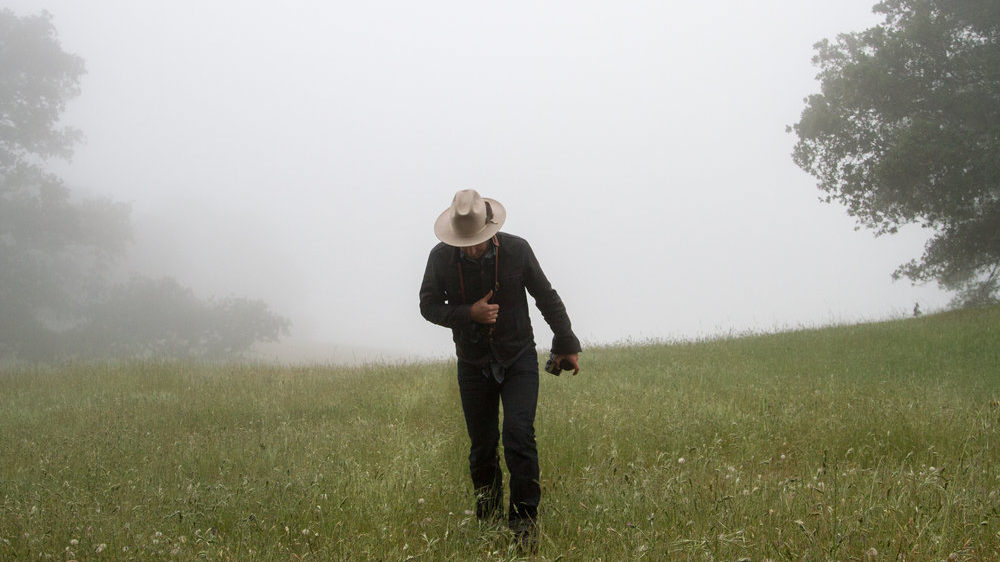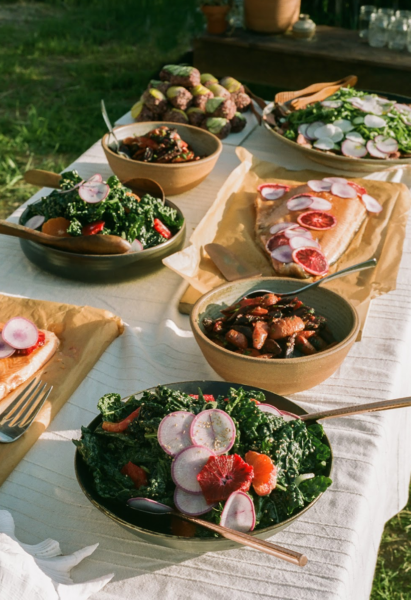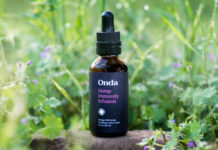It’s a whole cultural shift in our thought process. You’re paying for your health. You’re investing in your health when you eat good food, when you support good farmers and ranchers, and you’re doing the same when you use high-quality cannabis medicine.
Last month our co-founder and CEO, Stephen Smith, co-hosted a wholesome, thought-provoking CBD dinner event on the cliff sides of Topanga, California. Alongside the makers of Mercado Sagrado and guest chef, Jeffrey Ozawa of Tenzo and his team, Stephen was able to open a dynamic conversation rarely discussed- how we source and consume both our food and our cannabis matters. It matters for our personal health, for the health of our communities, and for the health of this planet. This conversation, paired with a seasonal, Japanese-inspired menu, refreshing Onda beverages, and a sunset view of the ocean, was welcomed by all senses, and opinions, alike.
We believe food is plant medicine as is our nutrient-rich Onda Oil. We also believe in the power of community discussion around the ethics, politics, sustainability, and vitality of a variety of farm and land management practices including regenerative agriculture and holistic ranching, as well as the healing properties of our products and why it matters how the hemp is farmed and processed.
Stephen and I recently sat down together to reflect on this time. The interview was audio-recorded then transcribed. Enjoy!
What were the intentions behind this event, and why did Mercado choose Topanga Canyon?
The whole point of the event was to continue the dialogue around the importance of whole food and whole plant nutrition, and how we can articulate why our particular process and our values of creating Onda Wellness and this plant medicine is parallel to why people consume really healthy food and why they eat whole foods to get the nutrients in that intended form and in that structure as they exist in the plant, as opposed to an isolated form like you see in CBD sodas or CBD isolate powder.
So we partnered up with Tenzo, based out of Los Angeles, and they are just absolutely, extremely talented, amazing chefs. And they got all local fish, produce, and beef from Scott River Ranch, here in California.
We hosted in Topanga because Heather, who runs Mercado Segrado, had this amazing space with a view. And it was nice to be out there looking at the ocean during sunset, eating good food, and having some good CBD beverages and snacks.
One of the intentions of this dinner was to open dialogue around whole-plant foods and medicine, what came of these conversations?
I felt like there were a lot of ah-ha moments. Folks realized that this dialogue around CBD, or how CBD has become a little more popular in the market these days, that it’s not just about the one cannabinoid. I think that’s kind of what we refer to the product line or the kind of genre, the kind of category of this supplement or this nutrient, but it’s not just about that particular cannabinoid. It’s about how the other parts of the plant work together to increase the efficacy of that cannabinoid alongside the others.
So yeah I think framing it in that context where people understand what you’re getting, say, not only vitamin C from that citrus but you’re getting all the other parts of that citrus so that your body can process those nutrients more holistically. Just framing it that way seemed digestible and I think for people it just kind of clicked, like ‘oh wow, that’s why ONDA is different. That’s why this product is working better because they’re not stripping it down and giving us some narrow version of what the plant’s producing’. I mean, who would want to eat like that, you know? It clicked!
Do you feel there is a parallel between the food industry and the cannabis/hemp industry when it comes to the production and consumption of whole foods versus processed?
Yeah, I think it’s totally the same thing. Humans have this philosophy that we can use technology to improve upon Nature. And I think that’s very arrogant and is driven by efficiency and profit. That’s not how we need to operate as creatures on this planet with all these amazing nutrients around us. So yeah, overprocessed foods that increase shelf life and increase profits for the manufacturers, but you know, who gets the short end of the stick is the consumer because they’re eating a hollow, vapid, just horrible piece of food. So it’s the same parallel, and we want to bring attention to that. We want to make sure that as we grow, and we can get more and more people, we’re sticking to these values that are based around the integrity of the plant and really respecting it. There are lots of examples of how different food products have just completely devolved. Really headed down the wrong path and we want to make sure that people who understand that know that’s not what we’re about.
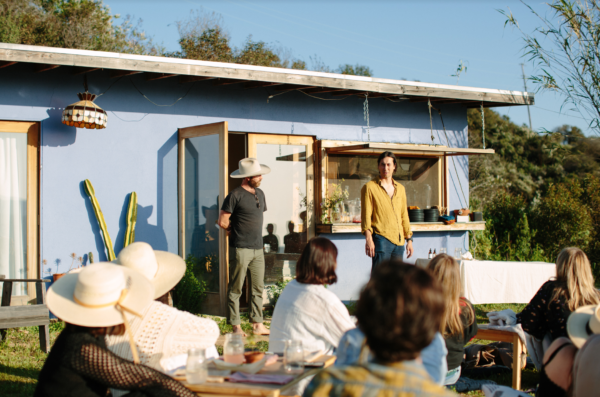
Do you think the cannabis industry is headed down the same path as the food industry, or do you have hope?
I have a little bit of hope *laughs* because it’s small right now. We don’t have corporate backing. We don’t have a ton of visible corporate influence in the cannabis space right now, or in the CBD world.
However, as more people grow hemp and start to follow the same models that any commodity industry has followed which are once again, profitability and efficiency potentially over nutrition value, flavor, or any of the other things that we’re interested in, you’re going to see a lot of people continue to go that way. Even a lot of the small CBD producers are selling products that are produced with harsh chemicals, solvents, and machines, but we do it batch by batch and don’t use any of those things. So, we’re going to stick to that.
I mean we’ll see, I’m sure there’s going to be a split in the market. Where a lot of these brands just go higher volume, less expensive, but what’s the trade-off, right? The tradeoff is that it could be really hard to keep the same quality and really true, a deep array of nutrients. So, yeah it’s a tradeoff but I know what we’re going to do! So we’ll see what everyone else decides to do. Hopefully, they also value the nutrition and the health of their customers.
So you say there might be a split in the market, what do you feel is the best way to get customers to choose differently than from the old patterns of efficiency and profitability over quality?
Well, I think it’s really important for us to engage in a personal way with events and education. I also think that there is a split between inexpensive, processed groceries that are full of all sorts of things, and then really clean organic food and unfortunately, there is a big difference in the cost. But a lot of the time, that’s just what it costs to make a really good product. Because a lot of food being subsidized or the lowering of prices through efficiency and the industrialization of agriculture, people assume that those low, low prices are actually what it costs to make it. And that’s just not true. So education has to be not only why we do what we do and why we value what we do, but why it costs what it costs.
Of course, we want to make this as accessible to as many people as possible. We have no interest in this being an elitist or exclusive product, we want it to help people. So we’re working hard to get our costs down as much as we can, but that’s the other part of the education is really having that conversation, you know? Do you really need three televisions? Do you need to have those cocktails?
It’s a whole cultural shift in our thought process. You’re paying for your health. You’re investing in your health when you eat good food when you support good farmers and ranchers, and you’re doing the same when you use really high-quality cannabis medicine. So it’s more than just understanding the difference in our process and that we don’t strip the nutrients out, it’s also a conversation and education in prioritization of how you spend your money. And investing in good food and good plant medicine is investing in your health. That’s hard because it’s tricky when you see other products, whether it’s food or cannabis products, that are dirt cheap but I’ve always thought and been raised that you know, most of the time you get what you pay for. It does come down to education, events, and connecting with people. And typically when they try it and they use it, they get it. It clicks. This is a very different product.
Any closing thoughts? When you left that event did you have a spark of fire? What’s the next step?
It was just really nice to connect to people that are curious and want to have conversations surrounding Whole Hemp plant medicine. Gosh, the next steps, there are so many things we can do. I mean, I really want to continue to broaden and reach out to folks all over the country with different backgrounds, different perspectives. And I know that’s not going to happen overnight. You know, we’re kind of early in this industry, but I’m really excited about the future of making more connections with more people of all ages and backgrounds to see how this can help them. We get them coming in on the emails, we get a lot of contact from a pretty diverse group of people talking about how Onda has really changed their life, and I just look forward to more of that in person. It seems to be impactful. The fun things that have come out of these events to really help spread the word, we’re really grateful for it.
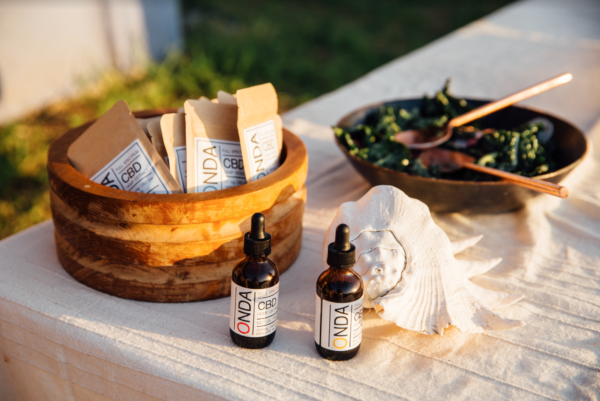
Be sure to check out our upcoming events through Instagram and our newsletter. We look forward to exploring more ways Onda can bring communities together and highlight the power of Whole Hemp™, whole foods, and plant medicine.

